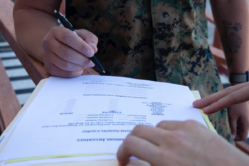Table of Contents
In a perfect world, all Guard and reserve members would receive travel reimbursements when they report to drill. Unfortunately, that is not the case. While some members are reimbursed for their travel expenses, not all branches of the military and not all units authorize travel reimbursements for attending regularly scheduled drills.
Thankfully, members of the National Guard and military reserves (including Reserve Corps of the Public Health Service) may be eligible to deduct travel-related expenses when they file their tax returns. If you live more than 100 miles from your duty location and stay overnight, you may be able to deduct travel-related expenses including mileage, hotel and lodging, parking fees, tolls and half the cost of your meals, up to the federal per diem limits.
Prior to the most recent tax system overhaul, the Tax Cuts and Jobs Act of 2017, it was also possible for members of the reserve component to claim expenses if they lived less than 100 miles away from their drill location. However, recent changes to the tax laws have made some changes to these rules. (We’ll cover this in more detail below.)
These deductions can be worth hundreds or even thousands of dollars per year. Let’s take a deeper look at these deductions to see how to qualify and claim them on your taxes.
Deducting Mileage and Travel Expenses for Guard/Reserve Duty
- Eligibility: To be eligible to claim these expenses, you must be a member of a reserve component of the Armed Forces of the United States, including the Army, Navy, Marine Corps, Air Force or Coast Guard Reserve; the Army National Guard of the United States; the Air National Guard of the United States or the Reserve Corps of the Public Health Service. These deductions for travel-related expenses are not available for active-duty service members.
- Only duty-related travel: All related travel expenses must be incurred for the sole purpose of serving on official duty in the Guard or reserves. If your travel is not for the sole purpose of official duty, then you cannot claim it as an expense on your tax return.
- You must travel at least 100 miles to your duty location: If you traveled more than 100 miles to your duty location, you can deduct your travel expenses to include mileage, lodging, parking, tolls and half the cost of meals. According to the IRS:
This deduction is limited to the regular federal per diem rate (for lodging, meals and incidental expenses) and the standard mileage rate (for car expenses) plus any parking fees, ferry fees and tolls. Claim these expenses on Form 2106 or Form 2106-EZ and carry them to the appropriate line on Form 1040. Expenses in excess of the limit can be claimed only as an itemized deduction on Form 1040, Schedule A. Source.
Current IRS Mileage Rates
- 2021 Mileage Rate: 56 cents per mile.
- 2022 IRS Mileage Rate: 58.5 cents per mile
Allowable Travel Expenses
According to the IRS, deductible travel expenses while away from home include, but are not limited to, the costs of:
- Travel by airplane, train, bus or car between your home and your business destination. If you are provided with a ticket or you are riding free as a result of a frequent traveler or similar program, your cost is zero.
- Using your car while at your business destination. You can deduct actual expenses or the standard mileage rate, as well as business-related tolls and parking fees. If you rent a car, you can deduct only the business-use portion for the expenses.
- Fares for taxis or other types of transportation between the airport or train station and your hotel, the hotel and the work location, and from one customer to another, or from one place of business to another.
- Meals and lodging.
- Tips you pay for services related to any of these expenses.
- Dry cleaning and laundry.
- Business calls while on your business trip. (This includes business communications by fax machine or other communication devices.)
- Other similar ordinary and necessary expenses related to your business travel. (These expenses might include transportation to and from a business meal, public stenographer’s fees, computer rental fees and operating and maintaining a house trailer.)
- Shipping of baggage, sample or display material between your regular and temporary work locations.
How to Track Your Travel Expenses
If you plan to track your mileage and other expenses for tax purposes, then you need to keep clean tax records. Here are some tips:
Tracking Mileage
A good way to track your mileage is to keep a mileage logbook in your vehicle. Record the mileage on your vehicle when you start and stop your trip, and write the total number of miles you drove. Record this for each trip you take over the course of the year.
You can record mileage with a standard notebook, mileage logbook, smartphone app or with software such as Quicken. Be sure to include the journey to and from your home, as well as all related travel to and from your hotel and the base, if it is for official duty.
Lodging and other expenses
It’s always a good practice to keep all related receipts if you are taking a tax deduction, particularly if you will be adding up multiple months’ worth of expenses. The amount of expenses you can deduct on Form 1040 is limited to the regular federal per diem rate (for lodging, meals and incidental expenses) and the standard mileage rate (for car expenses), plus any parking fees, ferry fees and tolls.
In some cases, you may not get receipts for all expenses, such as parking and tolls. In these cases, be sure to document the expenses in your travel notebook or by other means. For example, you could print a receipt for your tolls if you have a toll pass that tracks each toll you pass.
What if You Didn’t Track Your Expenses?
If you found out about this deduction partway through the year, you can still deduct your travel, even if you don’t have excellent records. However, you need to be careful – it is up to you to prove your expenses if you are audited. A good way to get a reasonable estimate of your travel is to use Google Maps, MapQuest or another online map service to determine the distance from your home to your unit.
Be sure to document the days you traveled and the number of trips, and you should have a fairly accurate estimate of your miles traveled. It would be more difficult to determine how much you may have paid for food, tolls and other expenses if you don’t have good records. It may be a good idea to forget about the other expenses if you can’t come up with a reasonably accurate list of expenses. Just work on keeping records from this point forward.
How to Claim Travel Expenses on Your Taxes
At the end of the year, add your related travel expenses. You will use this information to fill out Form 2106, Employee Business Expenses (PDF), or Form 2016-EZ, Unreimbursed Employee Business Expenses (PDF) – Form 2106 instructions. You will use this information when you fill out tax Form 1040.
If you use a software program to file your taxes, then your program will likely ask you if you have any related travel expenses for your duty with the Guard or reserves. If you use a professional tax service, then be sure to give this information to your tax preparer – he or she will take care of it for you.
You can find related information in IRS Publication 3, the Armed Forces Tax Guide, and in our article covering military tax tips.
How Reserve Travel Deductions Impact Your Taxes
The deduction for travel-related expenses is a top-of-the-line tax deduction to your gross income, meaning it directly reduces your income before your taxes are calculated. As an example, if your income for the year was $50,000 and you had $2,500 in travel-related expenses, you would subtract the $2,500 from your $50,000 income, leaving your taxable income at $47,500. Of course, this does not include other tax deductions you may be eligible to receive. So you may be taxed on a lower percentage of your income after accounting for all eligible tax deductions.
Exceptions to Travel Deductions
You cannot claim mileage or other expenses that are reimbursed. For example, some Guard or reserve units pay for lodging when their members travel from out of town for drill weekends. If your unit puts you up in a hotel for your drill weekend or reimburses your expense, you cannot also claim that as a tax deduction. That would be double-dipping, and fraudulent. You cannot also claim mileage expenses if your unit reimburses you for the miles you drove. This goes for all related expenses and possible reimbursements.
2018 Tax Year Changes
The Tax Cuts and Jobs Act of 2017 brought many changes to the U.S. tax system. The standard deduction was increased starting in tax year 2018. The rates almost doubled from 2017 to 2018, increasing from $6,350-$12,000 for single taxpayers and from $12,700-$24,000 for couples.
Other changes included changing the income tax brackets, lowering tax rates and reducing or eliminating certain itemized deductions. Many miscellaneous itemized deductions were eliminated, including the ability to deduct unreimbursed employee expenses on Schedule A of their taxes.
Guard and reserve members who travel less than 100 miles from their home to perform their military duties are no longer eligible to deduct their mileage on their taxes. Prior to these changes, they were able to claim travel expenses as a miscellaneous itemized deduction, which was subject to a 2% limit (travel expenses must be at least 2% of your adjusted gross income before you can claim the deduction on your taxes).
Members may be authorized reimbursement for these expenses if offered by their branch of service or unit. Otherwise, the expense is now completely out of pocket.
Net impact of change: The increased standard deduction likely makes up for the inability to deduct travel expenses as a miscellaneous itemized deduction.
Summary
The changes to the 2018 tax year mean you only need to track your mileage if you travel over 100 miles each way to your unit. That said, this is a very valuable deduction and is absolutely worth taking if you are eligible.
For example, a 100-mile journey each way turns into a 200-mile round trip. At $0.535 per mile, that adds up to a $107 deduction for each drill weekend. Twelve of those would equal a $1,284 deduction. This is the bare minimum situation and doesn’t include other expenses such as food or tolls.
My unit is approximately 210 miles from my residence. That puts my annual mileage around 5,040. At the 2018 rate of $0.535 per mile, that comes out to an above-the-line tax deduction of $2,696.40. That has a big impact when I file my taxes each year.Bottom line: Be sure to document your travel mileage and other expenses. They will add up quickly and could potentially put hundreds of dollars or more back in your pocket.




Comments:
About the comments on this site:
These responses are not provided or commissioned by the bank advertiser. Responses have not been reviewed, approved or otherwise endorsed by the bank advertiser. It is not the bank advertiser’s responsibility to ensure all posts and/or questions are answered.
DawnC says
In addition to uniform dry cleaning, can sewing new rank emblems be deducted as well? In addition is there any other items that are deductible?
Thomas G says
How do you deduct the air travel if you fly? I only saw an option for mileage reimbursement.
Ryan Guina says
Thomas, you can deduct the cost of the airline tickets. Keep your receipts in case you are ever audited.
Shannan says
Do I deduct reservists mileage under vehicle expenses or travel expenses? The one way commute is over 100 miles
Pavel says
Okay, I have to ask…
I live 52 miles from my duty station (not 100), but I have to travel to the station and back on both, Saturday and Sunday… I put 208 miles each drill weekend.
Does it still disqualify me from the tax cut?
Ryan Guina says
Hello Pavel, I do not believe it does. See the IRS rules for more info:
I wish you the best, and thank you for your service!
Pavel says
Yeah, the way it is worded (travel 100 miles from your house), it does not specify whether it is one trip or not… so over 2 days I drive 104 miles one way, and 104 miles the other way. That makes sense. Since it is two days drill, it is overnight.
Another question (I think I know the answer). All enlisted soldiers get their meals covered during the drill weekend, however, the officers have to pay out of pocket. Is that also tax deductible (as well as equipment, uniforms, and uniform alterings)?
Ryan Guina says
Pavel, the quote in my previous comment states “travel must be overnight and more than 100 miles from your home.” So that seems to disqualify round trip travel. The previous quote also states you can deduct unreimbursed meal expenses. I encourage you to read the source I listed as it contains more information that may be helpful.
You can deduct unreimbursed expenses for dry cleaning or laundry while traveling. However, equipment, uniforms, or alterations fall under a different IRS ruling, found on IRS Pub 529, Miscellaneous Deductions. Again, I recommend reading it for a more thorough understanding. You can also run these questions by a tax professional if you need further guidance.
George says
Have deductions for military travel changed under the new tax plan?
Ryan Guina says
George, great question, and I haven’t been able to find official guidance. Unreimbursed business expenses will no longer qualify as deductions. This typically includes unreimbursed milage. But I have not found a reference that addresses members of the Guard or Reserves. No longer receiving the deductions would have a huge impact on the hundreds of thousands of Reserve Component members who use this deduction each year. I’ll update this article when I find official guidance. Thanks!
EBrockway says
Are you sure the mileage rate is the full $0.5xx? (I’ll leave the number as a variable since this comment may be read after 2017).
The current (2017) OMR rate is $.017 per mile, not $0.53+.
Also “half the cost of meals”…? Unless your IDT is reimburseable by your unit, I thought you could only deduct the government meal rate. In my case as an officer, the 2017 government meal rate is Breakfast $3.45 , Lunch $5.55, and Dinner $4.85. Enlisted members cannot deduct the rate because they are compensated for meals in the IDT pay – officers are not. I don’t think you can keep receipts and only get half the regular MI&E rate.
Interested to read comments on this, and any corrections!
Here’s my most pressing concern: we have business to conduct at the unit. There are not enough systems to work on, or, the system is often down for maintenance and cannot sustain 100+ members for 5 computers. I would like to purchase a mobile hotspot for business use on drill weekend (because work still needs to get done!), and deduct the monthly service fee. Can I deduct the full fee or do I prorate the monthly service fee for only the days I’m on duty?
Jamie says
The 17-cent mileage rate you’re citing is for PCS moves. IDT is temporary duty, which uses the regular mileage rate applicable to business trave, the same rate that applies on a travel voucher for annual training.
Regarding the meals and incidental expenses (M&IE) rate, 26 U.S. Code § 62(a)(2)(E) says that the travel expenses include “per diem in lieu of subsistence,” so someone cannot claim the rate if allowed to eat for free at the DFAC (which as you point out is the typical arrangement for enlisted troops where government mess is available).
For officers or anyone else not given subsistence, the correct M&IE to use is the full Federal rate, not the government or partial meal rates used for active-duty TDY when government meals are available and directed. The GMR and PMR are rates that the military will pay as reimbursement for expenses when directed on orders. For out-of-pocket expenses when in IDT status, a reservist’s expenses are treated as a special category of unreimbursed business expense and not subject to the JTR restrictions you’re citing.
As to your mobile-hotspot question, are you asking about a mobile hotspot you can use to do civilian work outside of your duty hours over the weekends that you are away from home for drill, or to use to access government systems in a duty capacity?
Jack Vannatta says
Can an army reservist deduct the difference between the allowable mileage rate of 57.5 cents per mile and the lesser amount of the actual reimbursement amount from the reserve? The same question applies to meals, lodging and incidentals. My unit is several hundred miles from my home and I travel to the unit via commercial air.
Ryan Guina says
Hello Jack, Thank you for contacting me. Check with your unit accounting office to see if there is a special reimbursement rate for air travel. I believe there is one.
Also, there should be an allowable deduction rate for air travel for your taxes, but I’m not sure if that is for purchased airline tickets, or if you use your own airplane. I don’t want to give you the incorrect answer, so I recommend consulting a tax professional to verify this process.
Best of luck, and thank you for your service!
Keith Beyer says
Ryan,
Greetings. I stumbled across your site while I was searching for eligible tax write offs for Army Reservists.
Your page helped clarify some things. However, I had a question as it relates to mileage.
I serve as an Army Reservist. I have performed in tax year 2015, 240 military funerals. Approximately 1/2 of those funerals, (120), I have received mileage reimbursement. The other half (120, documented) were funerals that were 100 miles or less from my home.
I am a road warrior and my car is my office.
Is the local funeral mileage (< that 100 miles) accrued is deductible. I have followed the steps in TurboTax to fill out form 2106. They make it very easy.
Am I correct that the local funeral miles are deductible?
Thanks,
Keith
Jamie says
They are, provided you are doing these in military status (as seems to be the case) and the expenses are not otherwise reimbursed, but the local miles are not given the “above the line” treatment (deduction from income) that applies to the trips more than 100 miles from home.